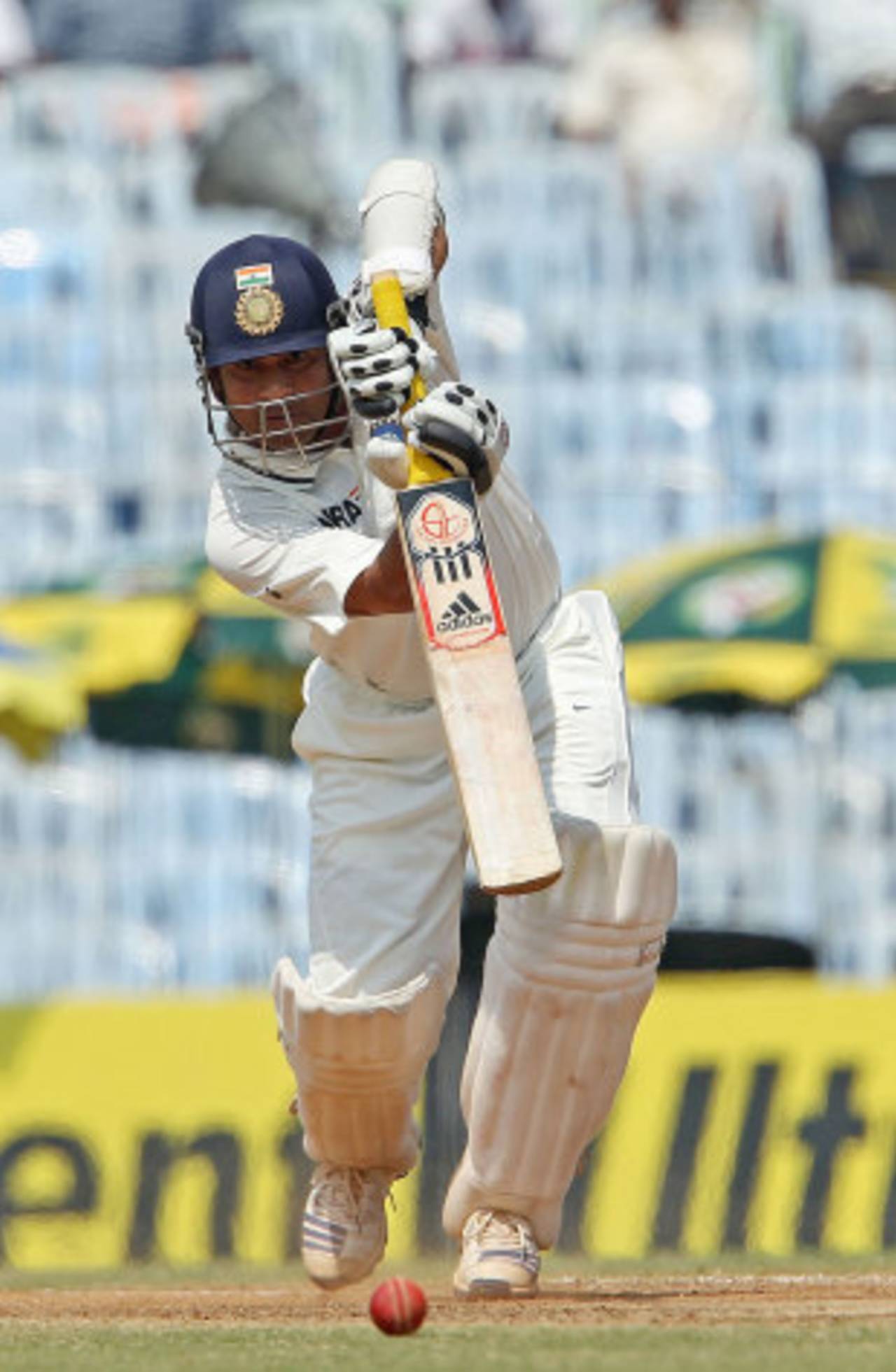Lahli perfects the balancing act
Haryana received good support from their home crowd, but the loudest cheer was reserved for a man from the opposition - Sachin Tendulkar
Abhishek Purohit in Lahli
Oct 27, 2013, 1:33 PM

File photo: The crowd's joy knew no bounds when Sachin Tendulkar brought out his signature straight drive • BCCI
The Chaudhary Bansi Lal Stadium in Lahli, outside Rohtak, has never seen an international game and it's location and limited capacity mean it won't see one for many years. However, it will not have missed the atmosphere that an international game brings, for the scenes outside and inside the ground today during the Ranji Trophy clash between Haryana and Mumbai had the feel of one, because of one man.
There was the same suffocating, overpowering police presence, traffic restrictions and multiple security checks. There were also India flags on sale, people getting faces painted in the tricolour, 'I love India' headbands, choley kulchey (street food) on offer. Long queues of fans were desperate to get in and policemen were hurrying along anyone they suspected of loitering.
When four boys broke the queue to head back to Rohtak, it became absolutely clear - if it already wasn't - what the thousands were lining up for. To watch Sachin Tendulkar bat. Haryana were batting first, they had found out. "It is as good as rain preventing the game," one of them said as he hopped over the bamboo delineating the queue. "The game is on TV anyway."
It turned out the boys had too much faith in their home team's batting, which they did not want to watch. Haryana were scuttled out in an extended opening session. Almost everyone, thousands of them, had stayed on despite the 'disappointment' of having their home team bat first.
They duly cheered every run Haryana made, but they also cheered every wicket. It was a fine balancing act. Of course, they had their fill of Tendulkar on the field, like crowds across India do. They tracked every movement of his, screamed for that one small acknowledgment from the man - a half-raised hand waved for a moment.
As Haryana kept losing batsmen, the noise grew with every wicket. They could see the end of their wait was near. But they also clapped whenever Mohit Sharma hit the ball in the air or past the infield. The balancing act again. When the last wicket finally fell and lunch was taken, people started discussing when Tendulkar would walk out.
Would he open? Improbable. Even Lahli knew that. No. 3 maybe? The ground was overjoyed when Kaustubh Pawar was bowled early, half-expecting to see Tendulkar walk out. Many began to stand and clap, the welcome they had reserved for only one man. It took them some time to realise the man of slight build who briskly walked in was not Tendulkar. Ajinkya Rahane, international cricketer, he may have been, but now he was only the man who had come ahead of Tendulkar.
When another Test cricketer, Wasim Jaffer, went to a diving catch at short midwicket, it was as if Haryana, or better still, India, had won the game. The full-blooded roar across the ground announced the end of the wait. There was no mistaking anything this time. Everyone, man and woman, child and adult, knew what was coming, and what was to be done.
They have perfected this routine even at Lord's and the SCG. Moments before the characteristic slow walk to the middle began, the entire stadium stood up as one and respectfully acknowledged the event it will never witness again after this match - Tendulkar arriving to bat. Most clapped, and those who didn't abandoned small talk. This man was who they had waited for. This man was why makeshift parking lots had been constructed on surrounding fields with a thick layer of sand. This man was why one side of the state highway leading to the stadium had been shut down a couple of kilometers away.
Every ball he faced was preceded with an expectation that built up to a crescendo. Every leave was applauded wildly. Countless others by men before him had barely registered, or were met with bored faces; "already this ground is so far. And we haven't come here to watch this." The straight drive for four was vindication for all the build-up, the wait, the jugaad (creative and inventive methods) to arrange tickets, the trip to the village of Lahli. For a while, there was no home team, there were no teams, there was no one else on the field.
When tea was called soon after, there were groans of disappointment. This was like the power had gone just when a Tendulkar innings began on television. Mohit Sharma ensured the power wasn't coming back anytime soon, disturbing Tendulkar's stumps off the seventh ball he faced.
Here was where it stopped being an international game. There would have been dead silence had this happened anywhere in India in an international match. Here, the crowd enacted a strange mixture of elation and shock. The balancing act again, and as fine as it could get.
Of course, the game ceased to matter now. "Nothing is left here now. What we came here for is over," remarked a woman as she prepared to leave. People hurried for the exits, which were soon clogged. A mass of people soon made its way towards the main gate. A handful, fewer than 10%, chose to remain. Suddenly, an international had become a domestic match. The Tendulkar effect was over, for the day.
Abhishek Purohit is a sub-editor at ESPNcricinfo